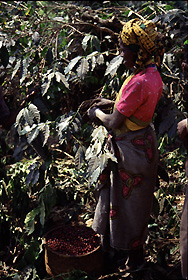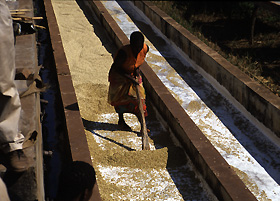| Period: 3 December 2003 - 31 March 2004. Country: Tanzania |
| (1) The Impact of the Decline of the Coffee Industry on the Livelihoods of Growers: The Case of Rural Communities of the Matengo in the Mbinga District, of Tanzania |
| MHANDO, David Gongwe (Division
of African Area Studies) |
| Key Words:Coffee, Cooperative Union, One License, Primary Society,
Trade Liberalization |
(2) Although coffee was introduced to Mbinga in the 1930s, it was not until the 1950s that production began to have a positive
impact on the local economy by providing tangible monetary gains. Thus, from the 1950s, the Matengo people of southern Tanzania have depended on coffee as their major
source of income. To facilitate the marketing of coffee, they established their own organisation, which dealt with the marketing of coffee as well as the supply of
agricultural inputs to growers. However, since the 1990s, coffee prices have been declining both on the world markets and at the farm gate. The decrease in coffee
market price has affected growers' income and subsequently the livelihoods of the Matengo have been deteriorating. Additionally, under the economic liberalisation
policy, private buyers were allowed to compete with the growers' organisation for the purchase of coffee, resulting in the collapse of the organization. This dissertation
aims at examining the effect of the decline of the coffee industry in Tanzania with specific reference to Mbinga, and on how this decline has affected the livelihoods of
the coffee growers. The study also aims to investigate whether the Matengo people have diversified to other income generating activities.

Photo 1: Harvesting the ripened coffee cherries. |

Photo 2: Removing the coffee pulp through fermentation. |
(3) Since 2002, I have been conducting research on the effect of declining coffee income on the livelihoods of the
Matengo coffee growers. The Matengo highlands are located in the South-western part of Tanzania, at an elevation of 900 - 2,000 meters above sea level. The
COE funds enabled me to conduct research in this area and collect and collate information on coffee cultivation, coffee income, and alternative livelihood
activities. The preliminary results indicate that:
-
Coffee growers have failed to find alternative sources of income. The reasons for this include the mountainous nature of the Matengo highlands,
which provides limited opportunities for alternative income generating activities. Likewise, the customary practices of the Matengo people limit
diversification away from the agricultural realm: their migrations from the highland areas to the lowland areas are mainly in search of agricultural
land and not for other income generating activities.
- The calendar of activities of the Matengo from November to April is a full one: some growers have given up working on coffee farming, which they
consider to be uneconomic and unviable, and instead have concentrated on bean and maize cultivation, which has recently become profitable.
The deliberate neglect of coffee plots has reduced the manpower available for tending to the coffee plots, in turn affecting the quality as well as quantity of yields.
- Taking advantage of the Coffee Industry Act of 2001, which allows growers' groups to directly auction coffee, some growers have initiated groups that have sold
coffee directly in auctions, and have fetched good prices (from 350 to 841 Tanzania shillings per kilogram). In addition, the income under this system is directly
related to the quality of coffee: the higher the quality, the higher the income. Thus, growers' groups organized by TECHNO SERVE and the District Agricultural Department
have managed to increase their income through better management of their coffee plots.
- The experience in management and operation of growers' groups in Mbinga, as well as in the Mbozi District of Mbeya Region, shows that given the chance, growers' groups
are better at procuring coffee and selling it directly in auctions than cooperatives unions, which are bureaucratic and expensive to run. Thus, growers have realised that
they can organise themselves into groups and do better than they did under the cooperatives unions. Therefore, efforts should be made to empower growers with management
and organisational skills in order to organise themselves to sell coffee directly to the auctions.
|


 21st Century COE Program
-Aiming for COE of Integrated Area Studies-
21st Century COE Program
-Aiming for COE of Integrated Area Studies-